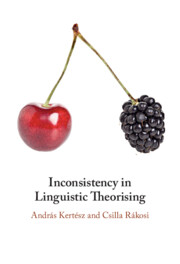Book contents
- Inconsistency in Linguistic Theorising
- Inconsistency in Linguistic Theorising
- Copyright page
- Dedication
- Contents
- Figures
- Tables
- Preface
- Abbreviations and central terms
- 1 Introduction
- Part I The State of the Art
- Part II Paraconsistency
- Part III Plausible Argumentation
- 6 From Paraconsistency to Plausible Argumentation
- 7 Inconsistency and Theory Change
- 8 The Treatment of Inconsistency in Optimality Theory
- 9 The Heuristics of Inconsistency Resolution
- Part IV Summary
- References
- Index
7 - Inconsistency and Theory Change
from Part III - Plausible Argumentation
Published online by Cambridge University Press: 23 June 2022
- Inconsistency in Linguistic Theorising
- Inconsistency in Linguistic Theorising
- Copyright page
- Dedication
- Contents
- Figures
- Tables
- Preface
- Abbreviations and central terms
- 1 Introduction
- Part I The State of the Art
- Part II Paraconsistency
- Part III Plausible Argumentation
- 6 From Paraconsistency to Plausible Argumentation
- 7 Inconsistency and Theory Change
- 8 The Treatment of Inconsistency in Optimality Theory
- 9 The Heuristics of Inconsistency Resolution
- Part IV Summary
- References
- Index
Summary
The present chapter applies the p-model to two stages of the development of German phonology in order to exemplify the role of inconsistency in theory change. It focuses on a detailed case study on the Basic Inconsistency of German Affricates. After the problem and its subproblems have been raised in , in , our analyses will show why Wurzel’s () eclectic framework, applying both terms of structuralist phonology and of Chomsky and Halle’s The Sound Pattern of English, yields a p-inconsistency without an acceptable p-resolution. In , we will examine whether Prinz and Wiese’s () CV phonology could avoid the shortcomings of this approach. In , we will draw conclusions from the case study that suggest generalisable methodological guidelines for the future treatment of inconsistency in linguistic theorising. Finally, in , we will answer the question of how the permanent interplay of the emergence and the resolution of inconsistencies shapes the development of linguistic inquiry.
Information
- Type
- Chapter
- Information
- Inconsistency in Linguistic Theorising , pp. 189 - 230Publisher: Cambridge University PressPrint publication year: 2022
